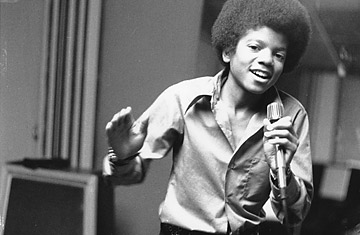
Michael Jackson at 13.
Right now we could all use a selective memory wipe — a magical eraser to remove all the misery Michael Jackson endured and caused. Just for a minute, we'd like to have pure recollections of the thrilling dancer and singer who dominated '80s music, created the all-time best-selling album of new songs (Thriller) and seemed the very model of the cool dude with the sensitive soul. And we wouldn't mind feeling some uncomplicated warmth for the young Jacko who, as the Cupid and Kewpie doll of the Motown brother act the Jackson Five, displayed the charisma that marked him for future and, we thought, perpetual stardom. Why can't a pop icon's life and legacy be as easy as ABC?
On the evening of his death from cardiac arrest, fans by the thousands convened at impromptu memorial sites. Unable to commemorate his passing at his star on the Hollywood Walk of Fame — it was covered by a red carpet outside the Chinese Theatre, where a Bruno premiere was to take place — the pop phenom's admirers placed notes and flowers further down Hollywood Boulevard on the star of a much less famous radio host who happened also to be named Michael Jackson. Newscasters mostly observed the rule of decorum in such matters: speak only good of the dead. As Josh Tyrangiel noted in his TIME.com obit, there was much good, much brilliance, to speak of. Hail to the King of Pop; rest in peace.
And yet, as Tyrangiel also pointed out, Jackson's memory is complicated, compromised, tainted. In some ways his decline was familiar: the star attraction whose star fades. Once the richest of pop idols, he flirted with bankruptcy in the past decade, selling many of his assets to Sony to wipe out huge debts. For years his main income came not from his own music but from royalties from much of the Beatles' catalog, which he owned. (He may have relinquished some of these rights in a financing deal with Sony; details were not made public.) Jackson was also forced to sell his Neverland ranch outside Santa Barbara, Calif., and auction off many of its treasures. Some antics, like dangling his infant son Prince from a balcony, tested the limits of what an eccentric celebrity could get away with.
Other aspects of Jackson's fall come close to being unique. For the past two decades, he has been famous for being infamous: the sad, self-mutilating creature who may have acted on impulses he thought were paternal but were in fact predatory. Accused twice of child molestation — the first time, in 1994, he escaped trial by paying his accuser $22 million; he was acquitted in 2005 of a second charge — Jackson acknowledged the evidence was damning enough even to a public that demands little but that their stars offer a semblance of recognizable humanity.
Soon after his career went stratospheric, Jackson went extraterrestrial. With the aid of plastic surgeons who should have known better, he almost literally defaced himself. For some imaginary Madame Tussaud's, he transformed himself into his own waxed figure, a modern Phantom of the Opera in pallor and disfigurement. A pop star has problems when his fans can't bear to look at him.
Jackson's life was never, ever normal. For a celebrity of his magnitude, to be seen is to be smothered, to be a star is to be a freak, to be loved is to be abused. A poignant and appalling case history that could have come straight out of Krafft-Ebing, Jackson's childhood was marred by mistreatment. In a 1993 interview with Oprah Winfrey, he recalled his youth, when his father Joseph was making millions off his sons' popularity. Jackson said that in puberty — "very sad, sad years for me" — his father routinely called him ugly, "and I would cry every day." When Winfrey asked, Did your father ever beat you? Jackson tried to smile as he said yes. Then, in an aside to his father, he added, "I'm sorry. Please don't be mad at me." With that wincing smile, Jackson was like a wounded orphan who has walked through fire and has booked a return trip.
